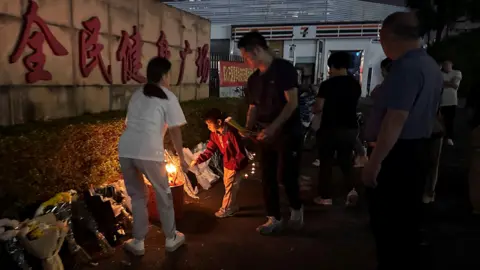
 Reuters
Reuters
Mourners laid flowers outside the stadium in Zhuhai after the attack
A man who killed dozens by driving his car into people exercising outside a stadium in southern China has been sentenced to death.
Fan Weiqiu was accused of "endangering public safety", according to a court statement.
At least 35 people were killed and dozens more injured in the 11 November attack in Zhuhai, thought to be the deadliest on Chinese soil for a decade.
According to the court, the 62-year-old decided to drive his car into the crowds on a running track at high speed because he was "dissatisfied" with how his property had been divided following his divorce.
The court described his motive as "extremely vile" and "the methods" as "particularly cruel". One witness told Caixin news magazine he had driven "in a loop" leaving victims "hurt in all areas of the running track" - a popular location for people to exercise.
Fan - who was initially reported to be in a coma, having sustained self-inflicted knife wounds - admitted his guilt in front of victims' families and members of the public, Chinese media reported.
The attack was one of 19 targeting strangers to take place across China this year - including two within a week of the Zhuhai attack.
Not all have involved vehicles. In February, a mass stabbing and firearms attack in Shandong in February left at least 21 people dead. That incident was heavily censored by Chinese authorities.
In total, at least 63 people have been killed and 166 injured in these attacks. This is a sharp increase on previous years - 16 killed and 40 injured in 2023, for instance.
Some have suggested the increase in random attacks could point towards a general increase in frustration and anger as the economy slows and uncertainty over the future grows.
"These are symptoms of a society with a lot of pent-up grievances," Lynette Ong, professor of Chinese politics at the University of Toronto in Canada, told AFP news agency in November.

 16 hours ago
1
16 hours ago
1















 English (US) ·
English (US) ·